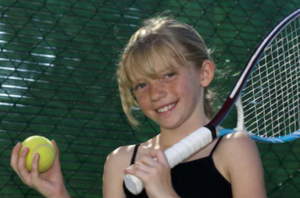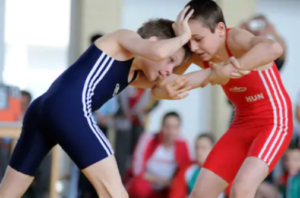
Take away the sports and you take away all the benefits that athletics provide for kids. Instead, ground them from mindless games.
“There is a difference between discipline and punishment,” says Dr. Tia Kern-Butler, a licensed psychologist for over 20 years who treats a broad range of issues including relationship problems and behavioral issues of children and adolescents.
“Discipline serves a purpose…to teach a child about choices and the consequences and rewards that come with those,” continues Dr. Kern-Butler.
“It teaches personal responsibility and accountability, thinking things through and learning from one’s mistakes.
“Punishment is designed to be punitive — to deprive in order to make a child feel bad or to inflict pain/displeasure because they did something wrong.
“With this is mind, parents need to ask themselves, ‘Why am I doing this?’ when they’re deciding upon a response to a child’s misbehavior.”

I was inspired to write this article after I reflected upon a conversation many years ago with a coworker whose tween daughter was involved in basketball.
Mary said that grounding Dayna from sports would be a very effective approach (I don’t recall if Mary said “punishment” or “discipline”) — and that Dayna knew that this would be a consequence for breaking rules.
I pointed out that grounding kids from sports is harmful because sports participation instills self-discipline, teaches them how to set goals, improves coordination and physical fitness, and they learn how to work together on a team.
Geez, what parent in their right mind would want to take all these benefits away from even the naughtiest child?
But Mary disagreed: “Oh no, I’m gonna ground her from sports because if she KNOWS she’ll lose her basketball, she’ll behave.”
Did Dayna behave perfectly as a result of knowing the punishment?
I’ll never know, but some parents delegate rules and expectations that are tough for kids to follow, netting punishment no matter how hard the child tries to avoid it.
This includes “discipline” for a behavior or a comment that the child didn’t know was an infraction until the parent reacted with, “Don’t you EVER tell your friends I used to weigh 200 pounds! You’re grounded from sports!”
Kids break rules—often out of innocent carelessness, or sometimes they have no idea that taking the last brownie without offering to split it with a sibling will anger a parent.
Some rules are obvious, like being home by a certain time.
But sometimes, circumstances can get in the way — such as losing track of curfew because they got absorbed in helping their friend’s dad build a model airplane.
Or maybe the rule was too difficult to follow, such as a heavy child being ordered not to eat any sweets at a social function, but then a kindly old lady urges the child to have some of her homemade fudge — and the child doesn’t have the heart to refuse.
And then Mom finds out…
Though sports participation instills discipline, this doesn’t mean young athletes will be immune to disobeying rules or doing things that would make the parent want to ground them, such as forgetting to do a chore.

Shutterstock/muzsy
“Discipline is proactive and punishment is reactive,” says Dr. Kern-Butler. “The best discipline is natural or logical consequences.
“Natural consequences occur naturally…you don’t wear a coat in cold weather, you’re cold!
“Logical consequences are tied to the poor behavior choice: ‘You don’t clean up your toys; the toys are taken away for a while.’
“So unless a child misbehaved during the sport they’re playing such as exhibiting poor sportsmanship, grounding a child from playing that sport is not a natural or logical consequence. It’s punitive.
“Whatever the child is being grounded for should dictate what is being restricted. In some cases, like being disrespectful, this is difficult to apply.
“In those cases there should be a set expectation regarding that behavior. For example, a family rule is we talk respectfully to each other.
“If you’re disrespectful you lose a privilege such as TV time, video games, screen time, etc. Sports are not a privilege per se, but they’re not a right either.
“They’re an important part of a healthy and active lifestyle and provide beneficial skills.
“Therefore, a parent should look for other activities to restrict before turning to sports.”
What to Take Away for a Grounding Other than Sports
- Computer games
- Comic books
- Cartoons or reality TV shows
- Star Wars figurines
- Dessert for a week
- Home smartphone use
- Music CDs
- Makeup
- Blow-dryer (be creative!)
Sports help build character, self-confidence, body confidence, and discourage excessive TV time, smoking, drinking and drug use.
Think very carefully before you’re tempted to take sports away as a form of punishment, discipline or whatever you wish to call it.
Sports should be a baseline in a child’s life, a constant.
Mindless games, toys and other shallow pastimes should be the variables.
Think very hard before grounding your child from something that can teach a lot of lessons, discourage obesity and encourage physical fitness.
 Currently in private practice Dr. Kern-Butler spent 10 years as the lead child and adolescent psychologist with Winter Haven Hospital and served as the mental health liaison for the Children’s Advocacy Center for 14 years.
Currently in private practice Dr. Kern-Butler spent 10 years as the lead child and adolescent psychologist with Winter Haven Hospital and served as the mental health liaison for the Children’s Advocacy Center for 14 years.
Professionalpsychologyofpinellas.com/about-me
 Lorra Garrick has been covering medical, fitness and cybersecurity topics for many years, having written thousands of articles for print magazines and websites, including as a ghostwriter. She’s also a former ACE-certified personal trainer.
Lorra Garrick has been covering medical, fitness and cybersecurity topics for many years, having written thousands of articles for print magazines and websites, including as a ghostwriter. She’s also a former ACE-certified personal trainer.
.









































